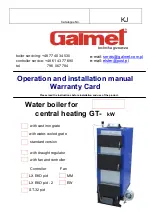
72
Installation & Service Manual
13
Troubleshooting
Table 13-3 Troubleshooting Chart - Noisy System
FAULT
CAUSE
CORRECTIVE ACTION
Noisy
Operation
-
Supply gas problem. Natural gas
pressures should be between 4 inches w.c.
and 14 inches w.c. LP gas pressures
should be between 8 inches w.c. and
14 inches w.c.
•
Refer to Section 7 - Gas Connections for
detailed information concerning the gas supply.
- Gas/air mixture problem.
• Refer to the Gas Valve Adjustment Procedure on
page 79 of this manual for the proper gas valve setting.
Verify that the vent/air intake lengths do not exceed the
maximum listed in Section 3 - General Venting.
- Dirty/damaged burner.
• Refer to page 66 in this manual for the burner removal
and inspection procedure. Clean or replace the burner
door assembly as necessary.
- Low water flow through the heat exchanger. • Refer to Section 6 - Hydronic Piping for minimum
flow rates. Verify that the boiler is piped in a primary/
secondary fashion and that the boiler and pump is
running on a call for heat.
- Air in the piping system.
• Properly purge all air from the piping system.
- Low system water pressure.
• Verify system pressure is a minimum of 12 psi.
No Pump
Operation -
Boiler Pump
or
DHW Pump
- Blown fuse.
• Replace fuse F1 on the control board, see page 69 of
this
manual.
Note:
Make sure pump amperage does not exceed
1.8
amps.
- Faulty pump.
• Replace pump.
- Internal fault on control board.
• Replace main control board.
Relief Valve
Opening
-
System pressure exceeds relief valve
setting.
• Lower the system pressure below the 30 psi rating of
the supplied relief valve or replace the standard relief
valve with a higher rated valve up to the maximum
pressure of the heat exchanger.
• Improperly sized expansion tank.
















































